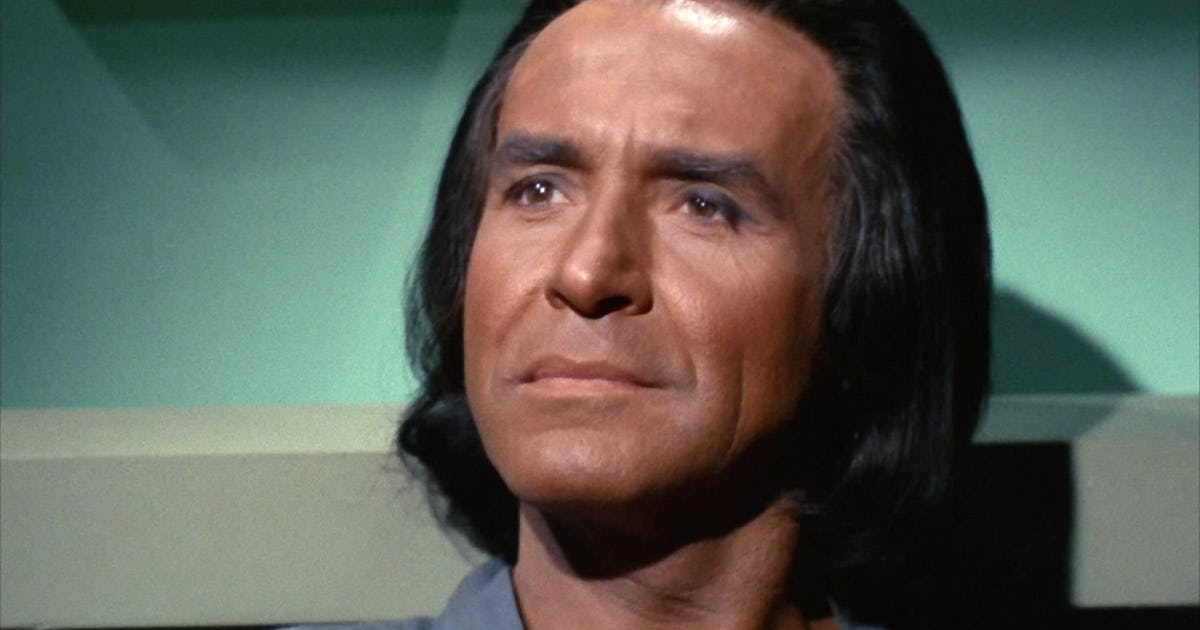While 1982’s Star Trek II: The Wrath of Khan is, arguably, tied with The Empire Strikes Back and Aliens for best sci-fi sequel of all time, the origin and meaning of Khan’s titular wrath is somewhat vague. When Capt. Kirk (William Shatner) exiles Khan (Ricardo Montalban) at the end of the 1967 Star Trek episode “Space Seed,” no one is particularly upset. Sure, Khan tried to take over the Enterprise, but Kirk recognizes he’s not all bad and is simply a man out of time; thus, Khan and his people should have their own wild planet. But when Khan returns in The Wrath, 15 years later, he’s furious and blames Kirk for all his troubles.
But why? And what happened to Khan’s wife, the former Starfleet historian Marla McGivers, who agreed to live with Khan on Ceti Alpha V? And how come all of Khan’s minions in The Wrath are so much younger than the folks in “Space Seed”? In the new audio podcast series Star Trek: Khan, all of these questions are answered, and then some. The show has just dropped its first episode on podcast platforms everywhere, and hardcore Trekkies everywhere are in for a surprising journey. Nothing in this new series undoes Trek canon at all, but it certainly creates a new layer.
Naveen Andrews certainly looks like a man who could play Khan in live action.
FOX/FOX Image Collection/Getty Images
“I just went straight to the source, which, to me, is Montalban,” Naveen Andrews tells Inverse of his inspiration to take on the role of Khan in the new audio series. Andrews is probably best known to genre fans for his role as Sayid in Lost. But the actor explains that the appeal of taking this part on was to honor the core canon of the character, specifically, the idea that Khan was of Indian descent, as is Andrews. “I’m not just of Indian descent. I actually am full-blooded Indian. And that’s part of why I thought I should do this.”
In the first several episodes, fans will notice that Andrews’ Khan has a decidedly softer side than what one might remember from the 1982 film, but also a quality that is simply one layer of the younger Khan we met in “Space Seed.” Co-writer of the series Kirsten Beyer — whose Star Trek credits are extensive — says that part of the way she approached writing Khan and Marla McGivers was to try to disentangle their romance from some of the outdated 1960s tropes, but without changing canon at all.
Khan and Marla at the end of “Space Seed.”
CBS Photo Archive/CBS/Getty Images
“Full disclosure, going back now for me and re-watching ‘Space Seed,’ I don’t see a relationship dynamic there that I find particularly appealing. I think [Marla is] a problematic lady at best,” Beyer explains. “I think at the time when she was presented, no doubt that was somebody’s ideal of what a romantic relationship might look like. But I look at it now, and I’m like, ‘Yeah, that’s straight up abuse, very dysfunctional.’ But Khan later calls her ‘my beloved wife,’ and you can’t ignore ‘Space Seed.’ So, I wanted to find a way to psychologically unravel what else is going on there.”
Co-written with longtime Trek writer David Mack — and based on a story from Wrath of Khan director Nicholas Meyer — Star Trek: Khan features a version of Marla, as Beyer hints, far more interesting and dynamic than the original character played by Madlyn Rhue in 1967. In fact, much like Naveen Andrews as Khan, the voice actor behind Marla in the audio series could easily play her in live action. Wrenn Schmidt, adored by fans for her role as Margo in For All Mankind, breathes new life into Marla, who she says was a character she could relate to on a personal level.
“I always find after the fact that, as an actor, there are more parallels than I realized between me and a character,” Schmidt says. “I was a history major in college in addition to being a theater major. So, the fact that Marla’s a historian, suddenly, that wasn’t something I had to work hard to make real. For Marla, nothing about what she’s confronted with is too cringe. It’s not cringe at all. It’s all amazing, or she wants to tell you about it, or wants to talk about it.”
Wrenn Schmidt brings new life to a classic Star Trek role.
David Livingston/Getty Images Entertainment/Getty Images
Schmidt also notes that just like Khan was a big reader, obsessed with Paradise Lost in “Space Seed” and, later, with Moby Dick in The Wrath of Khan, she thinks this audio series could make people interested in nonfiction books about history, even contemporary history. “I feel like there are so many parallels in this series that have happened in our real world, or even history that’s more recent.”
Andrews agrees that there is a bookish aspect to Star Trek: Khan, and to the character of Khan especially. His assertion is that Khan’s journey isn’t too different from Richard III or King Lear.
“He was still a Renaissance man,” Andrews explains. “It seems right to think of him in a way that puts him in literature. He was a man of letters, I suppose. For me, even more than Milton, it’s Shakespeare.”
Beyond its thematic and literary aspects, though, Khan does serve a kind of dot-connecting purpose for longtime fans. Not only will the series reveal the plight of Khan and his followers as they learn that Ceti Alpha V is full of eels that can control your mind once they go inside your ear, but it also answers one big question that The Wrath of Khan never really answered: Why are all of Khan’s followers so young, so many years after “Space Seed”?
“Job one was like OK, when David [Mack] and I started to look at the material, we were like, ‘Oh, this is a problem. Those guys are really young. Where did they come from?’” Beyer says. “And so, we answered that question in a way that I actually think is supported by canon.”
Khan’s very young and fit followers in The Wrath of Khan. The new podcast series reveals how these people came to exist.
Paramount Pictures
Beyer also mentions that, in addition to “Space Seed” and The Wrath of Khan, the canon of Khan and the Augments is bigger than just those two stories. In fact, the canon of the Augments continues in Strange New Worlds with La’an Noonien-Singh, and Beyer notes that the Season 2 episode “Tomorrow and Tomorrow and Tomorrow” has some relevance to Star Trek: Khan, since it did feature Khan as a child.
“I always feel incredibly responsible to whatever the source material is,” Beyer says of working with Star Trek canon. “I don’t get to change it. If it’s there, I’ve got to figure out a way to make it work that it is there. I can’t just ignore stuff. But I can go deeper.”
Star Trek: Khan is available on most podcast platforms.
Source link
Science Fiction,Star Trek,movies,tv-shows,podcasts,star-trek,entertainment,star-trek-strange-new-worlds,inverse-interview,homepage,hp-latest,adex-light-bid



Average Rating